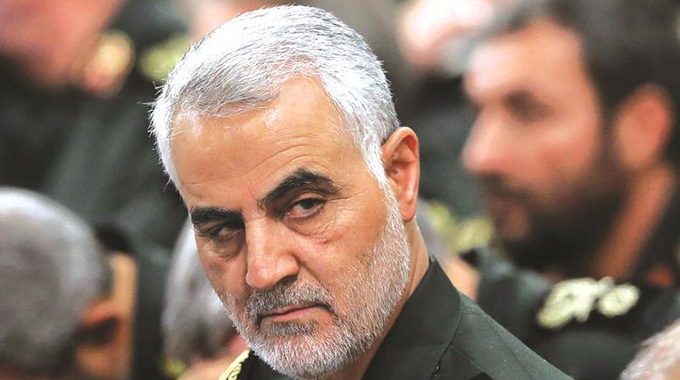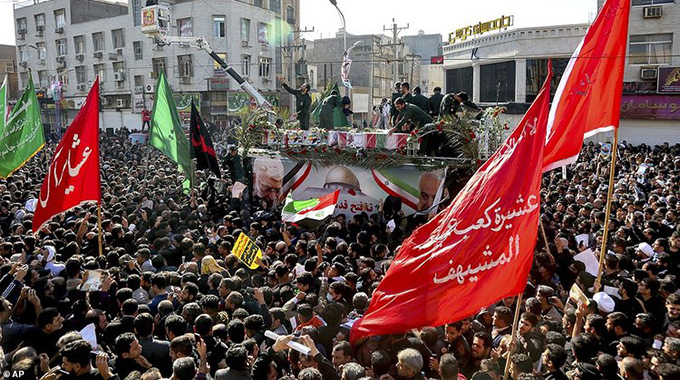Who was Maj-Gen Soleiman?

Major-General Qassem Soleimani, whose assassination by the US was confirmed last Friday, had played a major role in defending Iran against its enemies and assisting regional countries fight foreign occupation and terrorism.
Soleimani, born in 1957, started his military career by joining the Islamic Revolution Guards Corps (IRGC) following the victory of the Islamic Revolution in 1979.
During the imposed Iraqi war on Iran, which was launched in 1980 and lasted for eight years, Soleimani gradually became known as an adept commander, leading Iranian troops in numerous battles against invading Ba’ath regime forces.
Later appointed as chief of the IRGC’s expeditionary Quds Force, Soleimani gradually became a forefront figure in Iran’s push to assist regional States and allies counter foreign-backed interventions in the region.
As foreign-backed Takfiri outfits reared their heads in recent years, the IRGC commander emerged as a key strategist and ingenious commander leading Iranian military advisers assisting Syrian and Iraqi troops in battles against terrorists.
The general was frequently pictured on the front lines during anti-terrorism operations from Iraq’s Mosul to Syria’s Aleppo.
In Iraq, at the height of Daesh’s terror campaign, he assisted the Baghdad government in operations to retake the strategic oil-rich city of Tikrit from Daesh in 2015.
In January 2015, the head of Iraq’s Badr Organisation credited Tehran and Soleimani with saving Baghdad when Daesh first unleashed its campaign of terror in the neighbouring country a year earlier.
The general also took personal command of the battle against Takfiri militants in the Syrian city of Bukamal, located in Dayr al-Zawr Province, in November 2017.
In November 2017, Soleimani declared the end of Daesh’s territorial rule in a letter addressed to Leader of the Islamic Revolution Ayatollah Seyyed Ali Khamenei.
Earlier this year, the Khamenei awarded Soleimani with Iran’s highest military order, the Order of Zulfaqar.
Hailed both by the enemies and foes as a major military tactician, General Soleimani topped Foreign Policy (FP)’s 2019 list of Global Thinkers in defence and security.
In a statement last Friday, Iran’s leader vowed “harsh revenge” for the perpetrators of the attack.
Khamenei offered condolences to the Iranian nation and General Soleimani’s family, and declared three days of national mourning.
The US had long held off from killing the Iranian commander despite his role against US interests in the Middle East
The killing of the powerful Iranian commander Soleimani in a US air strike at Baghdad Airport ratchets up Iranian-American tensions to levels unseen in recent history.
Soleimani (62), known to his supporters as “Hajji Qassem”, had just arrived from Lebanon, according to Iran’s state news agency IRNA.
Waiting for him at the airport were Kataib Hezbollah leader Abu Mahdi Al Muhandis and Mohamed Al Jaberi, another senior figure in Iraq’s Iran-backed militias, who were also killed in the strike.
The operation was less about US intelligence learning of Soleimani’s exact whereabouts and more about the decision to eliminate him.
The leader of the Islamic Revolutionary Guard’s Quds Force had been a frequent visitor to Baghdad ever since the fall of Saddam Hussein in 2003.
US authorities were aware of his visits, and at times exchanged messages through intermediaries, according to the New Yorker.
Soleimani’s reach and influence in Iraq, Syria and Lebanon had grown significantly in the last 13 years.
He was a quiet strategist next to Hezbollah’s leader Hassan Nasrallah in Lebanon during the 2006 war against Israel, and a critical asset for the Bashar Al Assad regime who helped ensure its survival in Syria.
In Iraq, Soleimani was both feared and admired.
Former US presidents George W Bush and Barack Obama recognised his anti-US agenda, but did not order his killing so as not to risk wider conflict with Iran.
That is what makes Friday’s attack different.
A statement by the Pentagon confirmed that US President Donald Trump ordered the strike.
“At the direction of the President, the US military has taken decisive defensive action to protect US personnel abroad by killing Qassem Soleimani,” it said.
It accused Soleimani of “actively developing plans to attack American diplomats and service members in Iraq and throughout the region”.
But with Soleimani gone, the US may have opened the door for limited direct confrontation with Iran.
This is the highest-level assassination of an Iranian commander by the US since the 1979 revolution.
It is a game changer in terms of battle tactics and the scope of tensions between the two countries. – Press TV & thenational.ae










Comments